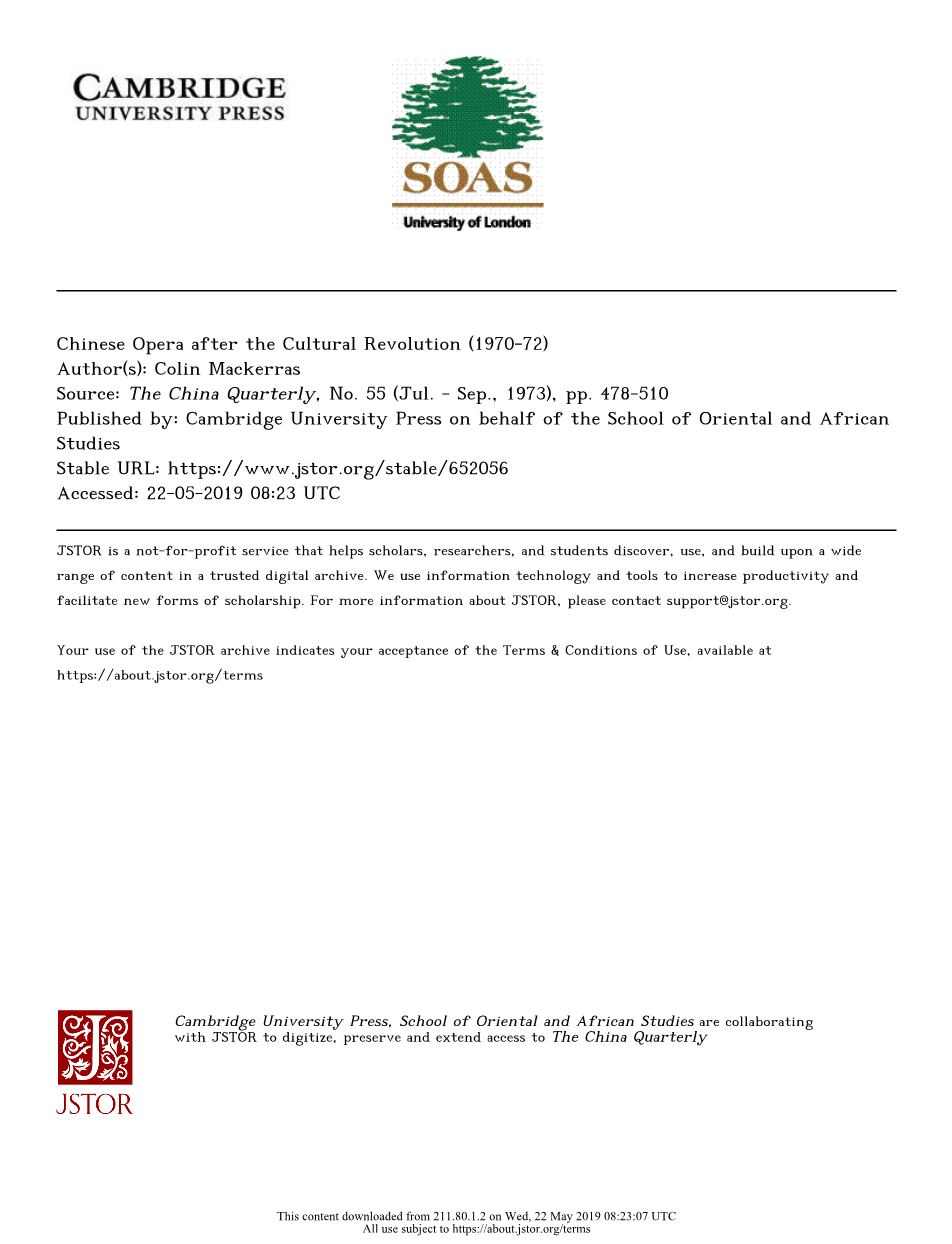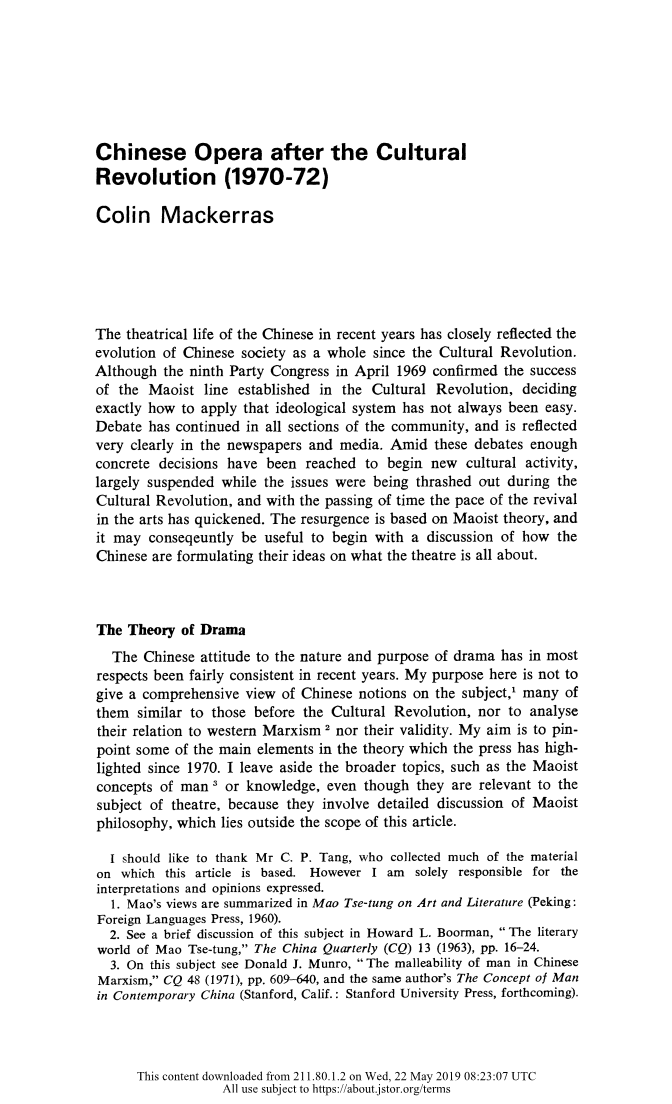

英语原文共 34 页,剩余内容已隐藏,支付完成后下载完整资料
文革后的中国戏曲(1970-72)
科林麦克拉斯
近年来,中国人的戏剧生活密切反映了文革以来中国社会的整体演变。虽然1969年4月的第九次党代会确认了文化大革命中确立的毛派路线的成功,但确定如何运用这种思想体系并不总是那么容易。讨论在社区的各个方面都在继续,并在报纸和媒体上得到了非常明确的反映。在这些辩论中,已经达成了足够的具体决定来开始新的文化活动,在文化大革命期间被解决的问题基本上暂停了,随着时间的推移,艺术复兴的步伐加快了。复兴是以毛主义理论为基础的,并且从讨论中国人如何制定他们关于剧院的所有想法开始讨论它可能会有用。
戏剧理论
近年来,中国人对戏剧性质和目的的态度在大多数方面都相当一致。我的目的不是要全面了解中国关于这一主题的观念,其中许多观点与文革前的观点相似,也不是分析它们与西方马克思主义的关系及其有效性。我的目标是确定自1970年以来媒体强调的理论中的一些主要因素。我把一些更广泛的主题放在一边,例如毛主义的人类或知识概念,尽管它们与戏剧主题有关。因为它们涉及毛泽东哲学的详细讨论,这不在本文的讨论范围之内。
正确的艺术路线的基本来源仍然是毛泽东不断引用“在延安文艺论坛上的谈话”,直到林彪于1971年垮台“文学作品论坛摘要”林彪同志委托蒋经同志“武装部队的艺术”也被认为是纠正戏剧理论的可靠指南。另一方面,负面的例子是臭名昭着的四重奏(ssu-fiao han-tzu),周阳,夏延,Trsquo;ien Han和杨汉生的作品,刘少奇经常加入其中。关于戏剧理论的新闻文章中有很大一部分将这四五个人的谴责,特别是仇阳作为起点。
所有关于戏剧的中国观念背后都是阶级斗争的概念,或两条界线之间的斗争。当代毛主义观点建立在所有艺术代表阶级利益的观念之上。当毛泽东写下:
在当今世界,所有文化,所有文学和艺术都属于明确的阶级,并且面向明的政治路线。事实上,没有艺术为艺术而存在的艺术,艺术超越了阶级或艺术,这些艺术脱离了政治或独立于政治。
革命的艺术必须服务于革命阶级的利益,并且是赢得或保留革命政治权力的机制的重要组成部分。它本质上是革命的宣传。事实上,无论是支持还是反对革命,无论其创作者的意图或信仰如何,任何艺术都不能避免进行宣传;任何宣称它超越宣传的说法只不过是一种欺骗。
当代中国人对戏剧的态度极其强烈。只有两条线,中间没有空间。歌剧是有益的还是有害的,它既不是,也不是无害的。实际上,刘少奇和“四重奏”因反对这一观点而受到攻击。
所谓的虚假马克思主义的“理论权威”已经对他们提倡的“无害但有益”的理论进行了这种阐述:“从政治角度来看,[文学和艺术]的作品可分为三种:一种是有益的,第二是无害的,第三是有害的。。。”可以理解的是,没有任何解释,周扬和他的团伙传播的无害文学只能唱出爱和[美丽的]风景#39;的赞美,并且“不表达任何阶级斗争的内容”恰恰是一种在资产阶级文学和艺术中具有极端欺骗性的糖衣炮弹,为刘少,提供了反革命的修正主义路线。。。他们心中的“爱”是剥削阶级的自负,这是他们赤裸裸的放荡。煽动人们对这种可耻的行为进行“歌颂”[称之为]一些“纯洁的爱情”恰恰是一种情节,是资产阶级反对无产阶级的狡猾的政治手段。 ......穿过周阳之流的谎言,[我们会发现]那些站在我们面前的人是一群用软刀杀死的恶魔。
今天的毛主义者认为这种企图在周扬集团的几乎所有声明中都忘记了阶级斗争。举例来说,剧作家或艺术家应该为谁创作他们的作品。毛主义者认为这是一个根本问题,并以“工人,农民和士兵”的口号来回答。他们指责“四方”提倡“全人类文学和艺术”的理论 (ch#39;iian-min we)。对他们来说,这样一个观念强烈倾向于强调对资产阶级及其问题的同情,从而毒害工人,农民和士兵的思想财产所有的阶级应成为社会主义歌剧中攻击的对象,它不能为他们服务或受益。今天的毛泽东思想认为周阳的观念是“从颠覆无产阶级专政和实现资本主义复辟的对象中脱离阶级斗争的理论”。
同样的推理证明了其他当代艺术和戏剧学说的合理性。在回答了“戏剧为谁?”这个问题之后,我必须问一下,戏剧的目的是什么?一个典型的答案在1970年10月27日的人民日报(第2页)中给出:为了掩盖他反对毛泽东思想传播的对象,周扬举起了一条用来招待民众的破旧旗帜。“他荒谬地说,”人们去剧院或电影院娱乐。没有人能说他去电影院接受教育。“这是对我们广大工人,农民和士兵的卑鄙诽谤。我们的工人,农民和士兵热切喜爱模范革命歌剧,他们热切地热爱革命文学艺术品,以便在毛泽东思想中受到教育。
文章继续指出,在过去,地主们把戏剧用于自己的娱乐,也作为对农民的思控制手段。娱乐本身并不坏,但是,就像其他一切一样,这与阶级斗争有关。娱乐绝对不是戏剧的主要对象,而只是一个必须从属于教育或革命宣传的子公司。这个原则同样适用于业余爱好者和专业人士的表现,并且像本节中提到的大多数其他概念一样,由于林彪的失败而没有任何变化。
在艺术的所有方面,西方最关心的是艺术表达自由。对于这个概念,毛主义者也应用阶级斗争的考验,并得出结论,自由只不过是一个艺术家所服务的阶级的问题。
资产阶级修正主义者总是以他们缺乏攻击和诽谤无产阶级文学艺术的自由为借口。在世界上只有具体的自由,没有抽象的自由。在阶级社会中,如果有资产阶级自由,那么就没有无产阶级自由。周扬所喊出的“自由文学”和“全人类和全人类的文学”是自由地煽动恶魔和怪物攻击社会主义,宣传资本主义,剥夺无产阶级的自由反击他们,并为恢复资本主义的犯罪阴谋服务。
外文原文
Chinese Opera after the Cultural Revolution (1970-72)
Colin Mackerras
The theatrical life of the Chinese in recent years has closely reflected the evolution of Chinese society as a whole since the Cultural Revolution. Although the ninth Party Congress in April 1969 confirmed the success of the Maoist line established in the Cultural Revolution, deciding exactly how to apply that ideological system has not always been easy. Debate has continued in all sections of the community, and is reflected very clearly in the newspapers and media. Amid these debates enough concrete decisions have been reached to begin new cultural activity, largely suspended while the issues were being thrashed out during the Cultural Revolution, and with the passing of time the pace of the revival in the arts has quickened. The resurgence is based on Maoist theory, and it may conseqeuntly be useful to begin with a discussion of how the Chinese are formulating their ideas on what the theatre is that about.
The Theory of Drama
The Chinese attitude to the nature and purpose of drama has in most respects been fairly consistent in recent years. My purpose here is not to give a comprehensive view of Chinese notions on the subject, many of them similar to those before the Cultural Revolution, nor to analyse their relation to western Marxism nor their validity. My aim is to pin- point some of the main elements in the theory which the press has high- lighted since 1970. I leave aside the broader topics, such as the Maoist
concepts of man or knowledge, even though they are relevant to the subject of theatre, because they involve detailed discussion of Maoist philosophy, which lies outside the scope of this article
The basic source for the correct line on the arts remains Mao Tse- tung#39;s constantly cited 'Talks at the Yenan Forum on Literature and Art,' although until Lin Piao#39;s fall in 1971 the “Summary of the Forum on the Work in Literature and Art in the Armed Forces with which Comrade Lin Piao Entrusted Comrade Chiang Ching ” 1 was also regarded as a reliable guide to correct drama theory. On the other hand the negative examples are the works of the infamous ' quartet ' (ssu-t#39; han-tzu), Chou Yang, Hsia Yen, T#39;ien Han and Yang Han-sheng whom Liu Shao-ch#39;i is often added. A high proportion of press articles on the theory of drama take the condemnation of these four or five especially Chou Yang, as their starting point.
Behind all Chinese ideas on the theatre is the notion of class struggle or the struggle between the two lines. The contemporary Maoist view rests on the idea that all art represents the interests of a class. Mao him self put it succinctly when he wrote:
In the world today all culture, all literature and art belong to definite classes and are geared to definite political lines. There is in fact no such thing as art for art#39;s sake, art that stands above classes or art that is detached from or independent of politics.
Revolutionary art must serve the interests of revolutionary classes, and is a vital part of the machinery which wins or preserves revolutionary political power. It is inherently propaganda for the revolution. Indeed, no art can avoid being propaganda, either for or against the revolution, whatever the intentions or beliefs of its creators; any claim that it is above propaganda can be no more than a deception.
Dualism is extremely strong in contemporary Chinese attitudes to drama. There are
剩余内容已隐藏,支付完成后下载完整资料
资料编号:[423107],资料为PDF文档或Word文档,PDF文档可免费转换为Word


